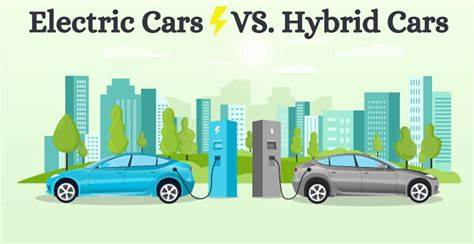
Hybrid vs. Electric Vehicles: Making the Right Choice for a Sustainable Future
Introduction
The choice of transportation not only affects our daily lives but also has a significant impact on the environment. As concerns about climate change and sustainability grow, the decision between hybrid and electric vehicles becomes increasingly important. This article aims to provide valuable insights to help readers determine which option is right for them.
Historical Background
Hybrid and electric vehicles have a rich history that dates back to the late 19th century when the first electric cars were introduced. However, it wasn’t until the late 20th century that hybrid vehicles, such as the Toyota Prius, gained widespread attention. Major milestones in the development of these vehicles include advancements in battery technology, regenerative braking systems, and the introduction of plug-in hybrids.
Key Concepts and Definitions
To make an informed decision, it is essential to understand key terms associated with hybrid and electric vehicles. Hybrid vehicles combine an internal combustion engine with an electric motor, allowing for improved fuel efficiency and reduced emissions. Electric vehicles, on the other hand, rely solely on electric motors powered by rechargeable batteries. It is important to consider terms such as plug-in hybrids, range anxiety, and the overall benefits and drawbacks of each type of vehicle.
Main Discussion Points
Environmental Impact and Efficiency
One of the main reasons people consider hybrid and electric vehicles is their positive impact on the environment. These vehicles produce fewer emissions compared to traditional gasoline-powered cars, leading to reduced air pollution and a smaller carbon footprint. Additionally, their superior energy efficiency helps conserve resources and combat climate change. While both hybrid and electric vehicles contribute to sustainability, their environmental impact varies based on factors such as the source of electricity and the specific hybrid model.
Performance and Driving Experience
Performance and driving experience are crucial factors to consider when deciding between a hybrid and electric vehicle. Hybrid vehicles typically offer smoother acceleration and a longer driving range compared to electric vehicles. However, electric vehicles are known for their instant torque and a quieter, more serene driving experience. Factors such as handling and noise levels may differ based on individual models and preferences.
Cost Considerations
Cost is an important aspect when considering a vehicle purchase. Although hybrid and electric vehicles generally have a higher initial cost than their gasoline counterparts, their long-term financial benefits should not be overlooked. Hybrid vehicles offer savings in terms of fuel costs and maintenance, while electric vehicles boast even greater savings due to electricity’s lower price compared to gasoline. Additionally, government incentives and tax rebates can significantly offset the initial cost of electric vehicles.
Case Studies or Examples
Real-life case studies and examples provide valuable insights into the experiences of individuals and companies who have made the switch to hybrid or electric vehicles. These showcase the benefits realized, such as reduced fuel expenses and a positive impact on the environment. Additionally, they shed light on any challenges faced, such as limited charging infrastructure or range anxiety, allowing potential buyers to have a more realistic understanding of what to expect.
Current Trends or Developments
Hybrid and electric vehicle technologies continue to evolve rapidly. Recent advancements include improvements in battery range, faster charging times, and the development of more efficient electric motors. Furthermore, the expansion of charging infrastructure is making it easier for electric vehicle owners to travel longer distances. Recent research findings and studies further contribute to the understanding of the benefits and potential limitations of hybrid and electric vehicles.
Challenges or Controversies
While hybrid and electric vehicles offer numerous benefits, they also face challenges and controversies. Limited charging infrastructure and range anxiety are common concerns among potential buyers. Battery disposal and the environmental impact of battery production are also subjects of debate. This section presents different viewpoints and arguments from both proponents and critics of hybrid and electric vehicles, allowing readers to develop a balanced perspective.
Future Outlook
The future of hybrid and electric vehicles looks promising. Advancements in technology and infrastructure are expected to further enhance the capabilities and convenience of these vehicles. Increased battery range, faster charging times, and a more extensive charging network will likely alleviate range anxiety and make electric vehicles a viable option for more people. Predictions indicate a significant increase in market adoption rates as prices continue to decrease and public awareness of their benefits grows.
Conclusion
The decision between hybrid and electric vehicles requires careful consideration of individual needs and preferences. Both options contribute to sustainability and offer various benefits, including reduced emissions and potential cost savings. By analyzing the environmental impact, performance, cost considerations, and real-life examples, readers can make an informed decision and contribute to a more sustainable future. Further research and exploration of the available options are encouraged to find the perfect fit.
References
“Advantages and Disadvantages of Hybrid Cars”, U.S. Department of Energy
“Electric Vehicle Charging Infrastructure: Guidelines for Cities”, International Council on Clean Transportation
“Hybrid vs. Electric Cars: Which Is Right for You?”, Consumer Reports
“The Environmental Impact of Electric Vehicles”, Union of Concerned Scientists
“Understanding Electric Vehicle Range Anxiety: An Early Empirical Analysis”, Journal of the Association for Information Science and Technology